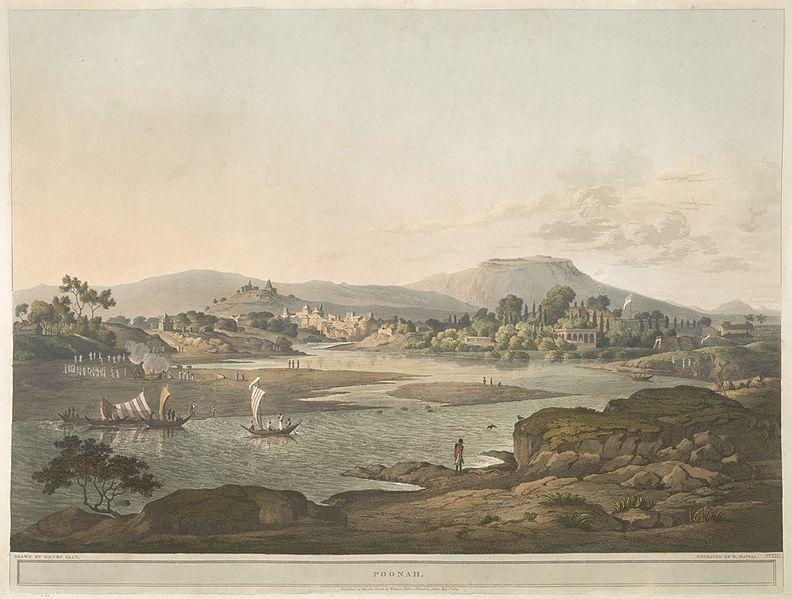
Watercolor painting of Pune in the late Peshwa era at the confluence of the Mula and Mutha Rivers by British artist Henry Salt
By Henry Salt (1780-1827) [Public domain], via Wikimedia Commons
Pune Skyline 2018.jpg
By Akshit 77 [CC BY-SA 4.0 from Wikimedia Commons
Twain’s and Smythe’s visit to Poona was a bit of a damp squib. Poona itself was at its colonial finest. The British had discovered a pretty little mountain town a hundred miles southeast of Bombay—but more importantly 1,500 feet above the rank humidity of the monsoon-prone coast. From June to September the governor and his government decamped to the hill station and moved their whole operation into Poona’s Governor’s House. Scattered around the surrounding hills were the old Peshwa palaces, with pride of place going to the Parvati hill temple—all remnants of past Hindu glories and all giving the area an added oriental heritage and zest. By 1896 Poona was a full-scale, but still small-scale, Raj summer resort and year-round military headquarters centered in the cantonment area.
...
So why was Twain’s visit such a damp squib? At the end of January Poona was empty of the big cheeses who brought it to life in the season. There was really only the nearby cantonment, and one imagines quite a few inhabitants of the Officers’ Mess were too arrogant to think they could be entertained by an American humorist. Certainly no one from the club met him and Smythe at the end of their five-hour train journey. Smythe recalled that the audience was really inadequate in numbers for the At Home Talk and The Century magazine reported that Twain’s voice was creaking and croaking—either he hadn’t totally shaken off the bronchial infection which had haunted him since Ceylon or the reporter wasn’t used to the slow drawl of a Mark Twain Talk. The Bombay Gazette reported that the Bishop of Bombay, who happened to be in Poona and in the audience, took exception to a rather tame morality joke about Adam and the serpent “and left the room therewith and not in the best of tempers. I am sorry that the Lord Bishop did not remain to hear Mark Twain on morals.” Further on the appreciative reviewer noted that “one woman disturbed every body by her loud laughter”, and was, when describing the audience, moved to rhyme:
A rather gushing one in cream
A perky one in black
A fair hared one in blue
Sitting next to one in ’lac
A lovely black fared with the palest pink
With bow to match
The effect was really swell.